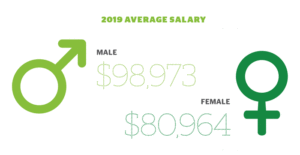It’s helpful to put the Convene Salary Survey 2019 results in perspective by comparing our findings to the larger workplace world. Let’s take a look at some key areas.
Stress
Event planners continue to make CareerCast.com’s list of the top 10 most-stressful jobs, coming in sixth in the 2019 listing, between broadcaster and newspaper reporter. CareerCast’s median salary for event coordinators is $48,290, and the job site projects an 11-percent growth in the role through 2026. The factors taken into consideration for stress level for more than 200 occupations that CareerCast evaluated are:
- Travel, amount of 0-10
- Growth Potential (income divided by100)
- Physical demands (stoop, climb, etc.) 0-14
- Conditions, Environmental 0-13
- Hazards encountered 0-5
- Meeting the public 0-8
- Competitiveness 0-15
- Death (own life at risk) 0-8
- Life of another at risk 0-10
- Deadlines 0-9
- Working in the public eye 0-5
CareerCast’s survey found that eight out of 10 Americans are reporting high job stress, and the most common stress factor cited is meeting deadlines. In 2017, 69 percent of CareerCast survey respondents rated their jobs with a stress level of 7 and higher; the 2019 poll found that 78 percent identified with a stress level of 7 or above.
Indeed, “stress” came up dozens of times in the open-ended comments about their jobs in the Salary Survey. When asked what s/he liked least about their job, one respondent wrote: “Lack of work/life balance. The unholy amount of stress. Short deadlines.”
While event organizers didn’t make The Job Network’s list of the top 10 stressful jobs, catering managers — who, according to the site, are among the “key players responsible for making an event run smoothly” — did.
Long Hours
According to data from the Bureau of Labor Statistics, the average American spends 40.3 hours at work per week, not including commute time. That’s low compared to this year’s Salary Survey respondents, who report working an average of 46 hours per week. And 40 hours seems almost part time for the nearly one-quarter of respondents who work more than 51 hours on the job each week. Long hours were cited by dozens of respondents as what they liked least about their jobs.
Salary Increases
After several years of seeing average pay increases of less than 3 percent, the Bureau of Labor Statistics data revealed that pay levels for hourly workers increased by 3.2 percent in 2018. Data released in mid-December by HR consultancy Mercer indicated that employers anticipated U.S. private-sector salaries, including merit and promotion-related pay increases, will rise by 3.4 percent over 2018 compensation. Here’s one stat where event organizers beat the overall average: the average increase for all Salary Survey respondents this year was 4.64 percent.
Vacation Time
Similar to last year’s Salary Survey results, only 21 percent of respondents reported taking all of their vacation days, and slightly more took some vs. most of their accrued vacation and personal days (39 percent vs. 37 percent).
According to Expedia.com’s 18th annual Va- cation Deprivation study, which questioned 11,144 employees from 19 countries about work-life balance last year, respondents from the United States, Japan, and Thailand reported the lowest vacation usage — an average of 10 vacation days. For the past four years, U.S. workers have reported taking between 11 and 14 of their allotted 14–15 days per year in the Expedia study. Finances were cited as the biggest barrier to taking a vacation in this year’s Vacation Deprivation study; 17 percent said it was simply because they couldn’t take time off work; and 13 percent reported feeling guilty when they take time off.
Gender Wage Gap
The generally accepted figure for the gender pay gap is that women make 80 cents for every dollar men earn, which corresponds to this year’s Salary Survey results: On average, female respondents earned 82 percent of what their male colleagues earned: $80,964 vs. $98,973.
 When asked whether they think gender-based wage inequity is common in the meetings industry, 67 percent of respondents said yes. Breaking that down, 58 percent of male respondents and 69 percent of female participants agreed that it’s common. And those who have earned their CMP were more apt to identify wage inequity among the sexes — 74 percent with the CMP versus 61 percent without the CMP designation. One might surmise that despite earning the CMP and the increase in pay that brings, business event professionals still find the designation doesn’t bridge the gender wage gap.
When asked whether they think gender-based wage inequity is common in the meetings industry, 67 percent of respondents said yes. Breaking that down, 58 percent of male respondents and 69 percent of female participants agreed that it’s common. And those who have earned their CMP were more apt to identify wage inequity among the sexes — 74 percent with the CMP versus 61 percent without the CMP designation. One might surmise that despite earning the CMP and the increase in pay that brings, business event professionals still find the designation doesn’t bridge the gender wage gap.
In terms of age groups, those between the ages of 30-39 are most in agreement with the belief that men out-earn women (73 percent in this age group vs. the overall average of 67 percent). Considering that these are the prime childbearing years, this comes as no surprise. It’s when women become working mothers that the wage gap widens. University of Massachusetts Professor Michelle Budig has found that men’s earnings increased more than 6 percent when they had children, while women’s decreased 4 percent for each child they had.
“I am positive that if a male were in this role in this organization, he would make more than I am currently making,” wrote one respondent. “Gender and race-based wage inequality is arguably the greatest stain on this industry,” said another. “I think if more men did what we did, there is no way we would all make below 80K a year,” yet another respondent wrote. Somewhat related to that, a number of respondents pointed out that they see more men in top positions in the industry than women. Said one: “Look around at meeting departments — standalone associations, corporate departments, and hotels. The majority of planners are women, majority of directors are men. Wages are secret for a reason!”
Michelle Russell is Editor in Chief of Convene.

